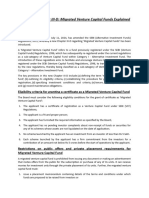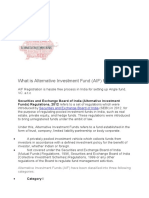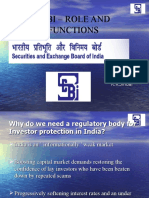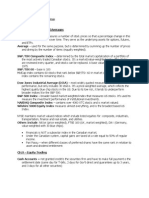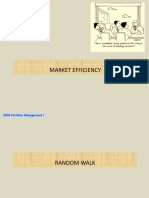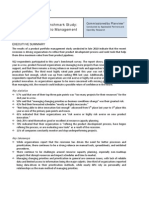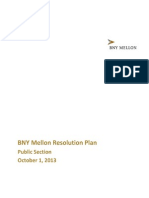Collective Investment Funds and Faqs
Collective Investment Funds and Faqs
Uploaded by
scribd_1008Copyright:
Available Formats
Collective Investment Funds and Faqs
Collective Investment Funds and Faqs
Uploaded by
scribd_1008Copyright
Available Formats
Share this document
Did you find this document useful?
Is this content inappropriate?
Copyright:
Available Formats
Collective Investment Funds and Faqs
Collective Investment Funds and Faqs
Uploaded by
scribd_1008Copyright:
Available Formats
COLLECTIVE INVESTMENT FUNDS: The idea of a collective fund is to lower costs through economies of scale by combining pensions and
profit-sharing funds. These pooled funds are grouped into what is known as a master trust account under the control of the bank, which acts as trustee, guardian, executor or administrator. SEBI ACTION AGAINST COMPANIES WRT COLLECTIVE INVESTMENTS: The Securities and Exchange Board of India (Sebi) has directed the Chandigarh-based Ocean Agro Farms Ltd to refund money collected under a collective investment scheme to investors within one month. The market regulator also debarred Chennai-based VGP Agro Farms Ltd, VGP Evergreen Plantations Ltd and their officials from operating and accessing the capital market for a period of 5 years. Action has been initiated for the company's failure to comply with a Sebi direction to refund money collected under the collective investment scheme, to the investors.
FAQS TO SEBI REGARDING CIS:
FAQ- Collective Investment Schemes
1. What is meant by Collective Investment Schemes?
A Collective investment scheme is any scheme or arrangement, which satisfies the conditions, referred to in sub-section (2) of section 11AA of the SEBI Act. Any scheme or arrangement made or offered by any company under which the contributions, or payments made by the investors, are pooled and utilised with a view to receive profits, income, produce or property, and is managed on behalf of the investors is a CIS. Investors do not have day to day control over the management and operation of such scheme or arrangement.
2. Which are the schemes not treated as CIS? The following do not constitute a collective investment scheme:
i.
ii. iii. iv.
v. vi.
vii.
viii.
any scheme or arrangement made or offered by a co-operative society or a society being a society registered or deemed to be registered under any law relating to co-operative societies for the time being in force in any State; any scheme or arrangement under which deposits are accepted by non-banking financial companies any scheme or arrangement being a contract of insurance to which the Insurance Act, applies; any scheme or arrangement providing for any Scheme, Pension Scheme or the Insurance Scheme framed under the Employees Provident Fund and Miscellaneous Provisions Act, 1952 any scheme or arrangement under which deposits are accepted under section 58A of the Companies Act, 1956 (1 of 1956); any scheme or arrangement under which deposits are accepted by a company declared as a Nidhi or a mutual benefit society under section 620A of the Companies Act, 1956 (1 of 1956); any scheme or arrangement falling within the meaning of Chit business as defined in clause (d) of section 2of the Chit Fund Act, 1982 (40 of 1982); any scheme or arrangement under which contributions made are in the nature of subscription to a mutual fund; 3. What is a Collective Investment Management Company? A Collective Investment Management Company is a company incorporated under the provisions of the Companies Act, 1956 and registered with SEBI under the SEBI (Collective Investment Schemes) Regulations, 1999, whose object is to organise, operate and manage a Collective Investment Scheme. 4. What is an existing Collective Investment Scheme? Entities, which were operating a collective investment scheme at the time of commencement of CIS Regulations i.e. (October 15, 1999), are deemed to be an existing collective investment scheme. 5. Can an existing Collective Investment Scheme raise further funds? An existing Collective Investment Scheme cannot launch any new scheme or raise money from the investors even under the existing scheme, unless a certificate of registration is granted to it by SEBI. In other words, after notification of regulations an existing collective
investment scheme, even after obtaining provisional registration as well as after obtaining credit rating cannot mobilise funds from the public unless a certificate of registration is granted to it. 6. Under what circumstances a company registered as a Collective Investment Management Company can raise funds from the public? A registered Collective Investment Management Company is eligible to raise funds from the public by launching schemes. Such schemes have to be compulsorily credit rated as well as appraised by an appraising agency. The schemes also have to be approved by the Trustee and contain disclosures, as provided in the Regulations, which would enable the investors to make informed decision. A copy of the offer document of the scheme has to be filed with SEBI and if no modifications are suggested by SEBI within 21 days from the date of filing then the Collective Investment Management Company is entitled to issue the offer document to the public for raising funds from them.
7. Will the unit certificates be listed on Stock Exchanges? Yes, they have to be compulsorily listed on the Stock Exchanges as mentioned in the Offer document. 8. Are the investors entitled to receive information about the schemes where they have invested and at what interval? The investor are entitled to receive a copy of the Balance Sheet, Profit and Loss account and a copy of the summary of the yearly appraisal report from CIMC within two months from the closure of the financial year. Further, the scheme wise annual report or an abridged form thereof has published in a national daily as soon as possible but not later than two calendar months from the date of finalisation of accounts. Also, scheme wise un-audited quarterly financial results have to be published in a national daily by CIMC within one month from the
close
of
each
quarter.
9. Does filing of offer document of a scheme by a CIMC with SEBI mean that investment in that scheme is safe and sound? It is to be distinctly understood that submission of offer document to SEBI should not in any way be deemed or construed that the same has been cleared or approved by SEBI. SEBI does not take any responsibility either for the financial soundness of any scheme for which the offer document has been filed or for the correctness of the statements made or opinions expressed in the offer document. It is the responsibility of the Collective Investment Management Company to ensure that the disclosures made in the offer document are generally adequate and are in conformity with the Regulations.
10. Under what circumstances can an existing Collective Investment Scheme be wound up? An existing collective investment scheme which failed to make an application for registration, or was not desirous of obtaining provisional registration, or has not been granted provisional registration, or having obtained provisional registration fails to comply with the provisions as laid down in the Regulations, was / is required to wind up the existing scheme. 11. What is the procedure for winding up of an existing Collective Investment Scheme? First of all an existing collective investment scheme has to send an information memorandum to the investors who have subscribed to the schemes, detailing the state of affairs of the scheme, the amount repayable to each investor and the manner in which such amount is determined. The said information memorandum has to be dated and signed by all the Directors of the scheme. The information memorandum has to explicitly state that investors desirous of continuing with the scheme
will have to give a positive consent, within one month from the date of the information memorandum, to continue with the scheme. If, positive consent to continue with the scheme is received from only 25% or less of the total number of existing investors, the scheme shall be wound up and payment be made to the investors within three months of the date of the information memorandum.
12. What are the redressal mechanisms available to an investor in Collective Investment Schemes who invested before the date of notification of the Regulations (i.e. before October 15, 1999)? Investors may note that many of the existing collective investment schemes had collected funds from the public prior to coming into force of the regulatory jurisdiction of SEBI and any action by SEBI against defaulting entities does not necessarily ensure the refund of money invested by the investors in such entities. 13. Is there some institution, which guarantees repayment of money now? As a regulatory body SEBI can not guarantee or undertake the repayment of money to the investors. 14. Whom to approach for Grievance Redressal ? Investors should approach CIS in this regard. If investors do not get satisfactory response thereto, they may write to SEBI. Further, investors can approach district consumer redressal forums in case entities fail to honour their commitments or for any deficiency in service. For bouncing of cheques, investors can move the courts under section 138 of the Negotiable Instruments Act as the right to file criminal complaint exclusively vests with the beneficiary of the cheque. Investors should further note that wherever they do not have a right to the land or to the produce arising out of the land such investment may be a deposit and where a company fails to repay the deposits, it attracts the provisions of section 58A of the Indian Companies Act, 1956. It is clarified that SEBI has no jurisdiction over such deposits.
15. What are the mechanisms available to an investor to know about the registration status of various entities either existing or new? On grant of registration as a collective investment management company, SEBI shall issue a Press Release giving the name and address of the entities which have been granted registration. Further, the same shall be posted on the SEBI website: www.sebi.gov.in 16. What are the penal provisions if a registered collective investment management company violates certain provisions of the Regulations? If, a registered collective investment management company violates certain provisions of the regulations, then action in terms of suspension/ cancellation of certificate may be initiated against the entity. Further, SEBI may, in the interests of the securities market and the ' investors, initiate criminal prosecution under Section 24 of the SEBI Act, apart from passing of directions such as a. requiring the person concerned not to collect any money from investor or to launch any scheme; b. prohibiting the person concerned from disposing of any of the properties of the scheme acquired in violation of the Regulations; c. requiring the person concerned to dispose off the assets of the scheme in a manner as may be specified in the directions; d. requiring the person concerned to refund any money or the assets to the concerned investors along with the requisite interest or otherwise, collected under the scheme; e. prohibiting the person concerned from operating in the capital market or from accessing the capital market for a specified period Note: The answers given here are general in nature. The questions and the answers have been structured to enable the readers to gain a broad understanding of SEBI(Collective Investment Schemes) Regulations, 1999. For exact details the reader is advised to refer to the SEBI (Collective Investment Schemes) Regulations, 1999 which are available on our website. Readers may also note that these answers do not aim to explain the Regulations in force, since answers to questions involving particular case / fact pattern may depend upon administrative decisions and Court orders, if any, in respect of the same.
You might also like
- Status Note On Collective Investment Schemes - 1326177032722-ADocument225 pagesStatus Note On Collective Investment Schemes - 1326177032722-AVivek Agrawal67% (3)
- Mutual Fund SEBI RegulationDocument17 pagesMutual Fund SEBI RegulationSarvesh ShuklaNo ratings yet
- Introduction To Portfolio ManagementDocument13 pagesIntroduction To Portfolio ManagementAbdul Lathif100% (2)
- FAQ-Collective Investment Schemes: (WWW - Sebi.gov - In)Document4 pagesFAQ-Collective Investment Schemes: (WWW - Sebi.gov - In)Mahimna KandpalNo ratings yet
- Collective Investment SchemeDocument3 pagesCollective Investment SchemeParas MittalNo ratings yet
- Collective Investment Scheme .Document35 pagesCollective Investment Scheme .tirthankarNo ratings yet
- CisDocument24 pagesCisolkpqNo ratings yet
- End Sem Notes - Securities (Kohli)Document53 pagesEnd Sem Notes - Securities (Kohli)Kumar VaibhavNo ratings yet
- CISDocument63 pagesCISSuRajUgaAdeNo ratings yet
- Collective Investment SchemeDocument8 pagesCollective Investment SchemeHarmanSinghNo ratings yet
- Mutual FundsDocument8 pagesMutual FundsHarmanSinghNo ratings yet
- Unit II-d-Collective Investment SchemeDocument5 pagesUnit II-d-Collective Investment SchemeRana Pratap SwainNo ratings yet
- SEBI (Alternative Investment Fund) (Third Amendement) Regulation, 2012 On July 20, 2024Document3 pagesSEBI (Alternative Investment Fund) (Third Amendement) Regulation, 2012 On July 20, 2024varshmey.akshita2No ratings yet
- Collective Investment Scheme (Cis)Document13 pagesCollective Investment Scheme (Cis)AdyashaNo ratings yet
- Securitisation of Debt (Loan Assets)Document7 pagesSecuritisation of Debt (Loan Assets)Sanskar YadavNo ratings yet
- NBFC RegulationDocument7 pagesNBFC RegulationanamulhaqahmedshahNo ratings yet
- CMS PPT 2Document9 pagesCMS PPT 2rashi bakshNo ratings yet
- FMR AssignmentDocument8 pagesFMR AssignmentSiddharth PandeyNo ratings yet
- SEBI (Venture Capital Funds) RegulationsDocument23 pagesSEBI (Venture Capital Funds) RegulationsDickench Das50% (2)
- Guidelines by SEBIDocument7 pagesGuidelines by SEBINeha KhemaniNo ratings yet
- Sebi - Role and FunctionsDocument27 pagesSebi - Role and Functionsfokat100% (1)
- Howey Test (Security Law)Document12 pagesHowey Test (Security Law)Samruddhi ShindeNo ratings yet
- Collective Investment SchemeDocument11 pagesCollective Investment SchemeSalman MSDNo ratings yet
- Redemption OF Debentures: After Studying This Unit, You Will Be Able ToDocument36 pagesRedemption OF Debentures: After Studying This Unit, You Will Be Able ToAkansha GuptaNo ratings yet
- Assientment 7Document6 pagesAssientment 7anvithapremagowdaNo ratings yet
- Credit Guarantee Scheme For Startups (CGSS)Document7 pagesCredit Guarantee Scheme For Startups (CGSS)narendar.1No ratings yet
- Investment Law MarketingDocument6 pagesInvestment Law MarketingJust RandomNo ratings yet
- Model Answer Sheet for Green Abhyaas Sheet - 12Document4 pagesModel Answer Sheet for Green Abhyaas Sheet - 12yaduvanshipushkar03No ratings yet
- Alternative Investment Fund RegistrationDocument6 pagesAlternative Investment Fund RegistrationParas MittalNo ratings yet
- Steps in A Pre and Post Public IssueDocument8 pagesSteps in A Pre and Post Public Issuearmailgm100% (1)
- Unit 11 Other Sources of Short Term Finance: ObjectivesDocument16 pagesUnit 11 Other Sources of Short Term Finance: ObjectivesPushpa RaniNo ratings yet
- Collective Investment Scheme FinalDocument10 pagesCollective Investment Scheme FinalRona Faith TanduyanNo ratings yet
- Corporate Finance NotesDocument38 pagesCorporate Finance NotesKirtika Chakraborty 2No ratings yet
- Article For JulyDocument7 pagesArticle For JulyfaridaNo ratings yet
- Angel FundDocument9 pagesAngel FundSahil Rawat100% (1)
- Sarfaesi ActDocument13 pagesSarfaesi Act..sravana karthik100% (5)
- Redemption OF Debentures: After Studying This Unit, You Will Be Able ToDocument34 pagesRedemption OF Debentures: After Studying This Unit, You Will Be Able TodeepakNo ratings yet
- Sarfaesi Act 2002Document9 pagesSarfaesi Act 2002Deepak Mangal0% (1)
- Buy Back of Share CapitalDocument27 pagesBuy Back of Share CapitalaveyibanayihaiNo ratings yet
- Supplements CMSLJune2024NewSyllabus06032024Document31 pagesSupplements CMSLJune2024NewSyllabus06032024vaishnavimohanta7No ratings yet
- 08 MF NBFC - UnlockedDocument23 pages08 MF NBFC - UnlockedBittu SharmaNo ratings yet
- Notes of 4. Issue of DebenturesDocument6 pagesNotes of 4. Issue of DebenturesatuldipsNo ratings yet
- Public DepositsDocument3 pagesPublic DepositsPrabhjot KaurNo ratings yet
- CMSL Supplement FinalDocument131 pagesCMSL Supplement FinalHEMANT PARMARNo ratings yet
- Why Do We Need A Regulatory Body For Investor Protection in India?Document17 pagesWhy Do We Need A Regulatory Body For Investor Protection in India?Amrita JhaNo ratings yet
- Cis & AifDocument16 pagesCis & AifAkankshaNo ratings yet
- Company DepositsDocument3 pagesCompany DepositsSathish V MenonNo ratings yet
- Deposit Provisions Under The Companies Act, 2013 - TaxGuruDocument12 pagesDeposit Provisions Under The Companies Act, 2013 - TaxGuruRoopam singhNo ratings yet
- AifDocument39 pagesAifRaviYamijalaNo ratings yet
- NISMDocument95 pagesNISMganeiza ganeizaNo ratings yet
- Financial Market Regulation AssignmentDocument8 pagesFinancial Market Regulation AssignmentaryanNo ratings yet
- Top 3 SEBI Orders Under The Takeover Code in The Year 2017Document11 pagesTop 3 SEBI Orders Under The Takeover Code in The Year 2017dhruv vashisthNo ratings yet
- SEBI Role and FunctionsDocument28 pagesSEBI Role and FunctionsAnurag Singh100% (4)
- Role of SebiDocument6 pagesRole of Sebishobhit_patel19No ratings yet
- Mutual FundsDocument3 pagesMutual Fundshemang.shroffNo ratings yet
- Crowdfunding in 2014 (Understanding a New Asset Class)From EverandCrowdfunding in 2014 (Understanding a New Asset Class)No ratings yet
- Textbook of Urgent Care Management: Chapter 46, Urgent Care Center FinancingFrom EverandTextbook of Urgent Care Management: Chapter 46, Urgent Care Center FinancingNo ratings yet
- Chap 12 Constructing PortfolioDocument55 pagesChap 12 Constructing PortfolioYibeltal AssefaNo ratings yet
- Pension FundsDocument33 pagesPension Fundsluvisfact7616No ratings yet
- About DSP BlackRock - Asset Management FirmDocument5 pagesAbout DSP BlackRock - Asset Management FirmPratik RoyNo ratings yet
- BFC5935 Portfolio Management and TheoryDocument36 pagesBFC5935 Portfolio Management and TheoryAlex YisnNo ratings yet
- Impact of Foreign Institutional Investment On Stock MarketDocument15 pagesImpact of Foreign Institutional Investment On Stock MarketVivek SahNo ratings yet
- AVI Letter To Chair of PSHDocument5 pagesAVI Letter To Chair of PSHZerohedgeNo ratings yet
- 360 ONE Balance Hybrid Fund NFO PresentationDocument35 pages360 ONE Balance Hybrid Fund NFO Presentationashish.sanghavi9218No ratings yet
- Ltcma Full ReportDocument150 pagesLtcma Full ReportJuan José Solis DelgadoNo ratings yet
- ISJ021Document84 pagesISJ0212imediaNo ratings yet
- Axis Bluechip Fund - One PagerDocument3 pagesAxis Bluechip Fund - One PagerjoycoolNo ratings yet
- Buscom Activity Chapter 2Document7 pagesBuscom Activity Chapter 2KendiNo ratings yet
- 2011-02-28 Brait Multi Strategy Fund OverviewDocument2 pages2011-02-28 Brait Multi Strategy Fund OverviewkcousinsNo ratings yet
- Alternative Investments - Zell Education 2022Document40 pagesAlternative Investments - Zell Education 2022Shubham MukherjeeNo ratings yet
- Wealth ManagementDocument85 pagesWealth Managementpriyanka kothari0% (1)
- Gail Taylor One Pager BioDocument1 pageGail Taylor One Pager BioJBEEBE77No ratings yet
- Making Good ChoicesDocument6 pagesMaking Good ChoicesdrgNo ratings yet
- Top 100 Finance - 230516 - 200117Document61 pagesTop 100 Finance - 230516 - 200117alimalan.aik59No ratings yet
- Fabozzi Bmas7 Ch23 ImDocument37 pagesFabozzi Bmas7 Ch23 ImSandeep SidanaNo ratings yet
- Leadgen Anirban 7th Nov 2013Document10 pagesLeadgen Anirban 7th Nov 2013Sanjay Hari HaranNo ratings yet
- Project Report On Comparison of Mutual Funds With Other Investment OptionsDocument57 pagesProject Report On Comparison of Mutual Funds With Other Investment Optionsdharmendra dadhichNo ratings yet
- Thesis Asset Management OwnershipDocument8 pagesThesis Asset Management Ownershipafktciaihzjfyr100% (1)
- RSM230 Chapter NotesDocument15 pagesRSM230 Chapter NotesJoey LinNo ratings yet
- Portfolio Management Transportation Business CH2MDocument8 pagesPortfolio Management Transportation Business CH2MKashif AmjadNo ratings yet
- Topic IdeasDocument14 pagesTopic IdeasAmanSethNo ratings yet
- CDC ToolkitDocument192 pagesCDC ToolkitRubal SaxenaNo ratings yet
- Market EfficiencyDocument233 pagesMarket EfficiencyRa'fat JalladNo ratings yet
- Planview 2nd Annual Product Portfolio Management StudyDocument28 pagesPlanview 2nd Annual Product Portfolio Management StudyDUOSTECHNo ratings yet
- BNY Mellon Resolution PlanDocument24 pagesBNY Mellon Resolution PlanMohan ArumugamNo ratings yet
- Citibank FraudDocument6 pagesCitibank FraudSahil ChhabraNo ratings yet












